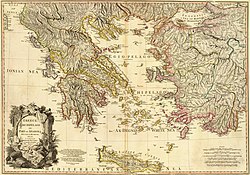 Global Information
Global InformationOttoman Greece information
| Ottoman rule in Greece Τουρκοκρατία στην Ελλάδα Tourkokratía stin Elláda | |||
|---|---|---|---|
| 1371–1912 | |||
 View of the Caryatid Porch, the Erechtheion, the west end of the Temple of Minerva Polias, and the Pandrosium on the Acropolis in Ottoman Athens in 1750s | |||
| Location | Greece | ||
| Including |
| ||
| Monarch(s) | Sultans of the Ottoman Empire | ||
Chronology
| |||
| History of Greece |
|---|
 |
|
|
The vast majority of the territory of present-day Greece was at some point incorporated within the Ottoman Empire. The period of Ottoman rule in Greece, lasting from the mid-15th century to the successful Greek War of Independence that broke out in 1821 and the First Hellenic Republic was proclaimed in 1822 (preceded by the creation of the autonomous Septinsular Republic in 1800), is known in Greek as Tourkokratia (Greek: Τουρκοκρατία, "Turkish rule"; English: "Turkocracy").[1] Some regions, however, like the Ionian islands and various temporary Venetian possessions of the Stato da Mar were not incorporated in the Ottoman Empire. The Mani Peninsula in Peloponnese was not fully integrated into the Ottoman Empire, but was under Ottoman suzerainty.
The Eastern Roman Empire, the remnant of the Roman Empire, which ruled most of the Greek-speaking world for over 1100 years, had been fatally weakened since the sacking of Constantinople by the Latin Crusaders in 1204.
The Ottoman advance into Greece was preceded by victory over the Serbs to the north. The Ottomans first won the Battle of Maritsa in 1371. The Serbian forces were then led by the King Vukašin of Serbia, the father of Prince Marko and the co-ruler of the last emperor from the Serbian Nemanjic dynasty. That was followed by an Ottoman victory during the 1389 Battle of Kosovo.
With no further threats, the Ottomans besieged and took Constantinople in 1453, then advanced southwards into Greece and captured Athens in 1456 and the Peloponnese in 1460. The Greeks held out in the Peloponnese until 1460, and Venetians and Genoese clung to some of the islands, but by the early 16th century, all of mainland Greece and most of the Aegean Islands were in Ottoman hands, excluding several port cities that were still held by the Venetians (notably Nafplio, Monemvasia, Parga and Methone). The mountains of Greece were largely untouched and were a refuge for Greeks who desired to flee Ottoman rule and engage in guerrilla warfare.[2]
The Cyclades islands, in the middle of the Aegean, were officially annexed by the Ottomans in 1579 although they had been under vassal status since the 1530s. Cyprus fell in 1571, and the Venetians retained Crete until 1669. The Ionian Islands were never ruled by the Ottomans, with the exception of Kefalonia (from 1479 to 1481 and from 1485 to 1500), but remained under the rule of the Republic of Venice. It was in the Ionian Islands that modern Greek statehood was born, with the creation of the Republic of the Seven Islands in 1800.
Ottoman Greece was a multiethnic society. However, the Ottoman system of millets did not correspond to the contemporary notion of multiculturalism.[3] The Greeks were given some privileges and freedom, but they also suffered from the malpractices of its administrative personnel over which the central government had only remote and incomplete control.[4] Despite losing their political independence, the Greeks remained dominant in the fields of commerce and business. The consolidation of Ottoman power in the 15th and the 16th centuries rendered the Mediterranean safe for Greek shipping, and Greek shipowners became the empire's maritime carriers and made tremendous profits.[5] After the Ottoman defeat at the Battle of Lepanto, however, Greek ships often became the target of vicious attacks by Catholic (especially Spanish and Maltese) pirates.[5]
The five century period of Ottoman rule had a profound impact in Greek society, as new elites emerged. The Greek land-owning aristocracy that traditionally dominated the Byzantine Empire suffered a tragic fate and was almost completely destroyed. The new leading class in Ottoman Greece were the prokritoi[6] (πρόκριτοι in Greek), which were called kocabaşis by the Ottomans. They were essentially bureaucrats and tax collectors and gained a negative reputation for corruption and nepotism. On the other hand, the Phanariots became prominent in the imperial capital of Constantinople as businessmen and diplomats, and the Greek Orthodox Church and the Ecumenical Patriarch rose to great power under the Sultan's protection and gained religious control over the entire Orthodox population of the empire, whether it spoke Greek, Albanian, Latin or Slavic.
- ^ Bruce Merry, Encyclopedia of Modern Greek Literature, oTurkocracy, p. 442.
- ^ World and Its Peoples. Marshall Cavendish. 2009. p. 1478. ISBN 978-0-7614-7902-4.
The klephts were descendants of Greeks who fled into the mountains to avoid the Turks in the fifteenth century and who remained active as brigands into the nineteenth century.
- ^ Maurus Reinkowski, "Ottoman "Multiculturalism"? The Example of the Confessional System in Lebanon". Lecture, Istanbul, 1997. Edited by the Orient-Institut der Deutschen Morgenlandischen Gesellschaft, Beirut,1999, pp. 15, 16.
- ^ [1]Douglas Dakin, The Greek Struggle for Independence, 1821-1833. University of California Press, p. 16.
- ^ a b http://press.princeton.edu/chapters/i9187.pdf [bare URL PDF]
- ^ Clogg, 2002 [page needed]